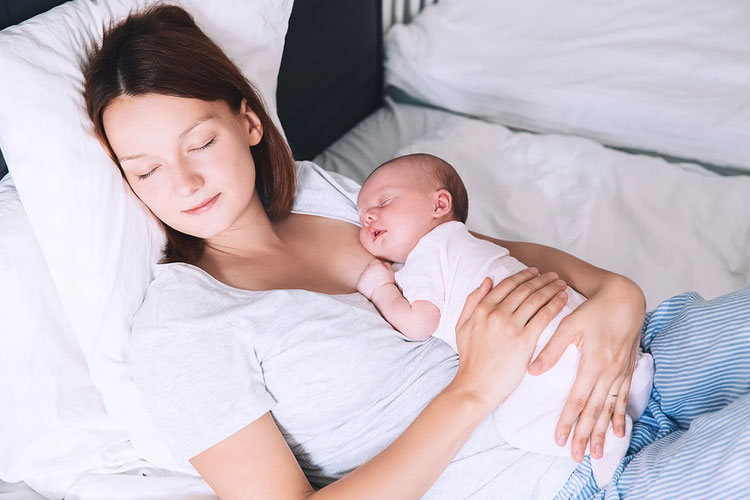“Menopause is the condition faced by the women of age 45 to 50 when their menstrual cycle going to ceased permanently.”
Internally, it is the condition when the women’s ovaries start stopping the production of hormones called “ESTROGEN” and “PROGESTERONE” which results in the menstruation period to stop.
Menopause means that women can no longer support pregnancy. These hormonal changes also cause some other problems like weight gain, mood fluctuations, disturbed sleep, depression, etc.
The major difficulty that arises during menopause is the unwelcomed disturbed sleep. There are some common sleep issues that women have to deal with during their menopause period and their possible better and smart solutions.
Insomnia
Insomnia is the disorder in which people have trouble sleeping at night. During menopause, women got stuck in this INSOMNIA disorder, facing difficulty in falling asleep or staying asleep for long-desired time. Generally followed by nocturnal awakening with trouble in going back to sleep or difficulty in finding a comfortable sleep position.
Symptoms:
- Day time sleepiness, depression, or anxiety.
- Not able to concentrate on things and difficulty in remembering.
- Irritability and aggressive mood.
- Feeling a tired or very low level of energy to do work.
Solution:
There is a treatment called “HORMONE REPLACEMENT THERAPY” which evolves taking “ESTROGEN” a hormone that the women during menopause secrete in very less quantity or don’t secrete. It helps women to have better comfortable and long sleep. You should concern your doctor during this period and ask if HRT is suitable for you or not.
Moreover, avoid taking alcohol or tobacco during this period. Set your calming bedtime routine followed by a relieving bath before bedtime or reading a mind setting book. Try to stay calm.
Sleep Apnea
A serious sleep disorder in which a person may have trouble breathing during sleeping.
Women suffering from menopause generally come across sleep apnea, having their oxygen blockage hundreds of times during sleeping time. It results in nocturnal awakening from sleep with the fear of oxygen loss and never going back to sleep.
There are two types of sleep apnea:
- Obstructive Sleep Apnea (OSP):
It is a more common type of sleep apnea in which the airway blocks due to the collapsing of soft tissues at the back of throat while the person is sleeping.
- Central Sleep Apnea:
It is the instability of the respiratory control center, in which the brain fails to regulate the muscles to breathe resulting in loss of oxygen.
COMMON FACTORS
Some common factors trigger the level of SLEEP APNEA LIKE:
- Irregular size of mouth features like the larger tonsils, larger tongue size or smaller jaw bone, etc.
- A person having sinus problems or nasal obstruction followed by allergies or deviated septum.
- Having a family history of sleep apnea either of the types.
Symptoms:
- Having regular high blood pressure.
- Symptoms of heart issues like stroke, heart attack, irregular heartbeats, etc.
- Mood fluctuations with depression and anxiety.
- Coming across the diabetes problems.
- Constant headache.
- Poor delayed performance during day time.
- Waking up with a dry throat and choking sensation.
- Loud snoring.
Solution:
Minor sleep apnea can be treated at home by changing some activities like losing weight, avoiding alcohol, tobacco, and smoking and finding good comfortable position to sleep, try not to sleep on your back.
Moreover, CPAP – “CONTINUOUS POSITIVE AIR PRESSURE” is a treatment in which a mask is worn by the affected person over the nose and mouth, which is connected to the machine responsible for the continuous flow of air up to the nose. It prevents airway blockages.
Night Sweats
If you got the hot flashes and night sweats that wake you from deep sleep, don’t worry about this. It is natural due to the less or stopped production of hormone, or you can say that the hormonal changes trigger the sweating procedure during night time.
It is a common cause of very 9th women from the 10 from premenopausal or menopause cycle. It causes discomfort to sleep with bad disturbed mood.
Symptoms:
- Constant mood fluctuations.
- The tired and low energy level in day time.
- Depressed or feeling suffocated.
Solution:
Having hot flashes doesn’t mean that you have any disease. Although not every woman can control her hot sweats with the same remedies you can try at least all so that you can know what remedy suits you to have a better sleep and suppress the sweats during night time.
- Wear loose clothes, good to have a material of clothes that sobs the sweats.
- Avoid tobacco, alcohol, or smoking.
- Don’t take heavy blankets or sheets while sleeping.
- Avoid eating spicy foods.
- Use a bedside fan or open the windows of the room or anything else that make your room less hot.
- Exercise during day time, it will give you ease in sleeping night time because of the reduced stress, good rate of breath, and normal metabolism.
Moreover, you can concern to your doctor because sometimes some deficiencies in our body result in excessive sweating.
The menopause or premenopausal cycle is likely to have by very women by the age of the late ’40s to early ’50s. So, ladies don’t be panic. By this make yourself comfortable as you can.





Leave a Reply